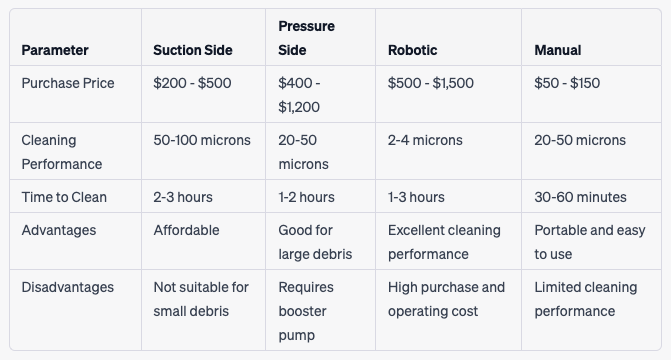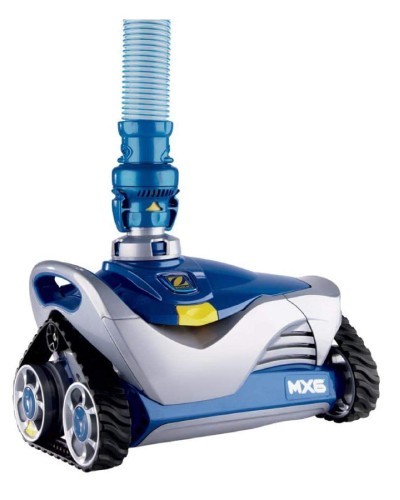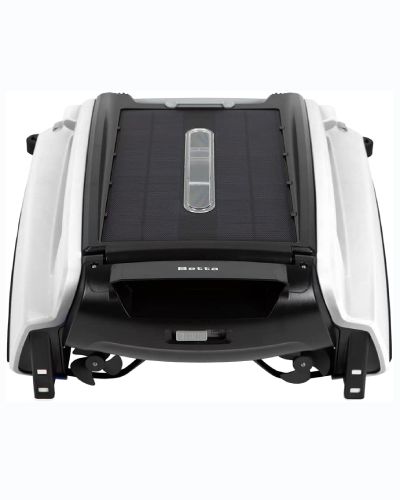- Salt Water Pool and Spa
- Pool Vacuum Cleaners
Pool Vacuum Cleaners
A pool vacuum cleaner will keep your pool looking sparkling clean and inviting all season long and most will do it while you're away or sleeping. With the many different types of vacuums available on the market you really have lots of choices depending on your budget and needs. If you are looking for complete automation there are great robotic automated cleaners that will clean your pool during downtime so it's nice and clean when you're ready to use.
There are also many great automated cleaners that operate either from the suction or pressure side of your pool system. They add an element of convenience because they operate on the same timing system as the rest of your pool hardware. A battery powered handheld cleaner is a great supplement to automated cleaners and can be used as the primary source of cleaning for smaller pools or spas.
Types of Pool Vacuum Cleaners
Technology has advanced in leaps and bounds in the pool vacuum cleaner industry, today’s models are more efficient, more reliable and last longer than ever before. An automated pool vacuum will make your pool maintenance so much easier and allow you more time to enjoy your pool. There are several options available when considering how to keep your pool spotless so be sure to follow the links to learn more about the amazing options as well as our recommended picks for salt water pool owners.
There are four main types of pool vacuum cleaners that operate using different types of power. A suction pool cleaner uses the intake pressure caused by the pool pump in the circulation system. A pressure cleaner uses the opposite force, it derives power from the outward pressure created by the pool pump on the return line. A robot pool cleaner is an independent unit that uses corded electricity while a battery powered cleaner is self explanatory but may use regular or rechargeable batteries.
- Suction Side Pool Cleaners
- Pressure Side Pool Cleaners
- Robotic Pool Cleaners
- Manual Battery Powered Pool Cleaners
- Solar Power Pool Cleaners
1. Suction Pool Cleaners
A suction side pool cleaner works by utilizing the suction power generated by the pool pump to move water around the pool and collect debris. The cleaner attaches to the pool's skimmer or a dedicated suction line with a flexible hose. The suction created by the pump causes the cleaner to move around the pool, while a brush on the bottom of the cleaner collects debris from the pool floor and walls. As the water is drawn through the cleaner, it passes through a filter and/or debris bag that collects the debris.
Suction side pool cleaners are typically the most affordable and easiest to install of all the automatic pool cleaners, aside from robotic models. The can, however, put additional strain on the pool pump and filter system, leading to increased energy costs and wear and tear on pool equipment. The reliance on the pool system can lead to reduced effectiveness if the pump is not working or sized properly or the pool system run times are adequate.
|
Purchase Price |
$200-$500 |
2. Pressure Pool Cleaners
A pressure pool cleaner utilizes the water pressure from your existing pool water pump to power its movement as well as the onboard turbine that vacuums debris into the unit. It's called a pressure side cleaner because they are designed to work using forced water from the pressure or return side of the pool circulation system. The cleaner can be attached to your existing plumbing system or it can be run off of a dedicated line with a separate booster pump.
They can be effective at cleaner larger debris like leaves and pebbles in addition to helping distribute clean water back into the pool as it crawls around. A pressure cleaner is likely to be more expensive to purchase and install that a suction side cleaner and can require more maintenance to keep the filter bag and canister clean.
|
Purchase Price |
$400-$1,200 |
3. Robotic Pool Cleaners
A robotic pool cleaner is a self-contained, electrically powered unit that operates independently of the pool's pump and filter system. They don't rely on the intake or return line of the pool which means they won't hinder the pool circulation system and can operate on their own schedule. They can be controlled remotely via a control unit that directs the cleaners movements or it can be set to work in a pre-determined pattern that won't miss any corner of the pool.
All robot cleaners are equipped with a set of brushes that scrub the pool surface floor and walls, filters debris in an onboard filter cartridge and collects in an attached collector bag. The sophisticated software enables them to clean all areas of the pool while avoiding obstacles like ladders. They are considered to be the most effective, and best type of pool cleaner. In addition they are easy to set up and don't require any special plumbing or electrical connections.
|
Purchase Price |
$500-$1,500 |
4. Battery Powered Pool Cleaners
A battery powered pool cleaner is the ultimate in convenience and ideal for spot cleaning or even keeping an entire small pool or hot tub clean. They operate on typical AA batteries or more commonly in recent years, rechargeable lithium ion batteries that can be recharged over and over again. You can let your automatic pool cleaner do the dirty work and when you need to do some minor cleaning or get in those hard to reach areas, a battery powered cleaner is perfect for getting every last bit of debris vacuumed up.
|
Purchase Price |
$50-$150 |
5. Solar Power Pool Cleaners
A solar power pool cleaner skimmer will constantly keep your pool water clean by targeting the surface where most debris ends up. This includes bugs, pollen, leaves or anything that blows into the pool during the day and night. The onboard solar panel will collect energy from the sun during the day and power it's onboard propellor system so it can reach every corner of your pool. It does this safely with its onboard navigation system radar and soft bumper technology. They have an onboard collector mesh and bag that can be manually emptied as often as needed.
|
Purchase Price |
$450-$550 |
Pool Vacuum Cleaner Comparisons
When choosing the right pool cleaner for your pool there are several factors to consider. You want to purchase a cleaner that will effectively clean your size and shape of pool. If you have a lot of debris in your pool from a nearby tree you may want to choose a cleaner with a larger capacity collection bag or more powerful suction. Some pool owners will want to take budget into consideration and may want to sacrifice some features for a reduce purchase price.
Pool Vacuum Cleaner Comparison Chart

Pool Vacuum Cleaners and Salt Water
All types of pool vacuums will work effectively in a salt water pool, no differently than a regular chemical chlorine pool. The only difference with salt water is you will want to prevent corrosion of internal vacuum parts but in todays units from major manufacturer's, they are made with parts that won't rust or corrode. In the past this could happen in any unbalance pool where chemistry levels fell out of balance.
Pool Vacuum Cleaner FAQs
What is the best pool vacuum cleaner?
What is the best pool vacuum cleaner?
If you were to grade a pool vacuum cleaner on overall performance metrics, cost and filter quality they best is the Dolphin Nautilus CC Plus robotic pool cleaner.
Which is better suction or robotic pool cleaners?
Which is better suction or robotic pool cleaners?
They will both get the job done but you simply can't beat a robotic pool cleaner with its onboard filter and collection bag, in addition to self-contained power.
Are robotic pool cleaners worth it?
Are robotic pool cleaners worth it?
Yes robotic pool cleaners are worth the initial investment due to their filtration quality, easy set up, low maintenance and overall performance.
What type of pool vacuum cleaner is best for my pool?
What type of pool vacuum cleaner is best for my pool?
It depends on your pool's size, shape, and type. Suction side pool cleaners work well for small to medium-sized pools with a simple design. Pressure side cleaners are better for larger, more complex pools. Robotic cleaners are effective for all types of pools and offer advanced features.
How often should I vacuum my pool?
How often should I vacuum my pool?
It depends on how much debris your pool collects. In general, you should vacuum your pool at least once a week to prevent the build-up of dirt and debris.
How do I know if my pool vacuum cleaner is working properly?
How do I know if my pool vacuum cleaner is working properly?
If the vacuum cleaner is moving around the pool and picking up debris, it is likely working properly. Check the filter for debris and make sure the vacuum's suction is strong.
How do I maintain my pool vacuum cleaner?
How do I maintain my pool vacuum cleaner?
Clean the filter after each use and store the vacuum in a dry place. Check for wear and tear on parts, and replace them as needed.
Can I use a pool vacuum cleaner with a salt water pool?
Can I use a pool vacuum cleaner with a salt water pool?
Yes, there are pool vacuum cleaners specifically designed for use in salt water pools. Look for corrosion-resistant materials to prevent damage from salt water.
Disclaimer
Please use all appropriate and proper safety precautions when attempting projects on this website. All projects are attempted at the reader's own risk.
Salt Water Pool and Spa™ participates in the Amazon Services LLC Associates Program, as an Amazon Associate we may earn a commission from qualifying purchases.




